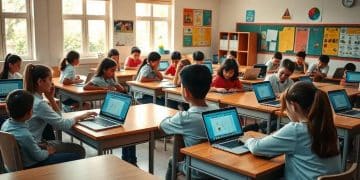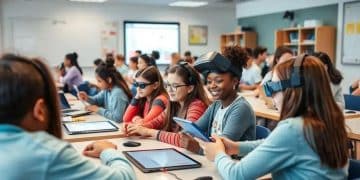Higher education trends shaping the future of online learning

Higher education trends shaping the future of online learning include hybrid learning models, skills-based education, global classrooms, and continuous improvement driven by data analytics.
Higher education trends shaping the future of online learning are transforming how we perceive education today. Have you wondered how these changes might impact your learning experience?
Emerging technologies in online learning
Emerging technologies are redefining online learning, making it more accessible and engaging than ever. With the rise of digital tools, students can experience education like no other time in history. This section will explore key technologies making waves in this sector.
Virtual Reality and Augmented Reality
Virtual reality (VR) and augmented reality (AR) are shaping the future of education. They allow learners to immerse themselves in their subjects through interactive experiences. For example, a student studying biology can explore a 3D model of a cell, enhancing their comprehension through visual and tactile learning.
Artificial Intelligence in Learning
Artificial Intelligence (AI) tailors the learning experience to each individual. Through adaptive learning technologies, AI can recommend resources and modify pathways based on a student’s performance and preferences.
- Personalized learning journeys
- Instant feedback systems
- Data analytics to track progress
The incorporation of AI makes education more efficient and student-centered.
Another exciting technology is the use of learning management systems (LMS). These platforms allow educators to manage courses, assess student performance, and foster communication. By utilizing these systems, institutions can optimize teaching processes.
Gamification Techniques
Gamification incorporates game design elements in non-game contexts, including education. By introducing point systems, badges, and leaderboards, students are motivated to engage more actively with their learning materials.
- Increased motivation and engagement
- Peer competition drives performance
- Fun learning environment
Ultimately, emerging technologies in online learning are revolutionizing education. They make learning more interactive, personalized, and enjoyable, catering to diverse student needs.
The impact of student-centered approaches

Student-centered approaches are transforming how education is delivered, focusing on the needs and preferences of learners. This method encourages active participation and fosters a supportive environment.
Personalized Learning Experiences
Personalized learning tailors education to meet the unique needs of each student. This approach allows learners to progress at their own pace, providing them with the opportunity to dive deeper into subjects they are passionate about.
- Flexible learning pathways
- Customizable learning resources
- Focused attention on student strengths
With personalized learning, students can take ownership of their education, leading to a more engaging experience.
Collaborative Learning Opportunities
Collaborative learning emphasizes teamwork and communication among students. Working together fosters a sense of community and helps students learn from one another.
In group projects or discussions, learners can share diverse perspectives and develop critical thinking skills. This interaction enhances understanding and retention of material. Students engaged in collaborative environments often exhibit higher levels of motivation and achievement.
Real-World Applications
When education connects to the real world, it becomes relevant and meaningful. Student-centered approaches often incorporate projects and problems that reflect real-life challenges.
- Hands-on projects related to community issues
- Internships and field experiences
- Service-learning opportunities
This relevance helps students see the value of their education, encouraging lifelong learning.
Overall, the impact of student-centered approaches is profound. By putting students at the heart of the learning process, education becomes more dynamic and effective, preparing them for success in an ever-changing world.
How to leverage data analytics for better outcomes
Data analytics is a powerful tool in education, helping institutions improve outcomes for students. By using data effectively, schools can identify areas for growth and tailor strategies to meet the needs of learners.
Understanding Data Analytics
Data analytics involves collecting and analyzing information to make informed decisions. In education, this could mean tracking student performance, attendance, and engagement levels. Educators can use this data to pinpoint trends and identify students who may need additional support.
- Identify at-risk students more effectively
- Monitor curriculum effectiveness
- Evaluate teaching methods and their impact
By understanding these analytics, teachers can make adjustments that positively affect student learning.
Implementing Data-Driven Strategies
Schools can implement strategies based on data insights to enhance student outcomes. For example, if analytics show that students struggle with a specific subject area, teachers can adapt their teaching styles or provide additional resources.
Professional development is another area where data analytics can play a role. By analyzing teacher performance data, schools can offer targeted training programs that address specific needs, leading to improved instruction.
Continuous Improvement through Feedback
Feedback loops are essential in leveraging data analytics. By regularly collecting and analyzing student and teacher feedback, schools can create a culture of continuous improvement.
- Conduct regular surveys to gather input
- Use analytics to evaluate program effectiveness
- Adjust strategies based on real-time data
This ongoing cycle allows for responsive changes that benefit the entire school community.
Overall, leveraging data analytics in educational settings leads to better outcomes. By focusing on student needs and continuously evaluating progress, institutions can create effective learning environments that foster success.
Future predictions for online degree programs

The future of online degree programs is bright and full of possibilities. As technology continues to evolve, educational institutions are adapting to new trends, making learning more accessible and effective.
The Rise of Hybrid Learning Models
Hybrid learning models are becoming increasingly popular. These models combine both in-person and online elements, allowing students to experience the best of both worlds. This blend caters to different learning styles and preferences, making education more engaging and flexible.
- Students can attend lectures online and participate in hands-on workshops.
- Hybrid models support diverse learning experiences.
- Flexible scheduling accommodates busy lifestyles.
As a result, students are more likely to succeed when they have choices that fit their needs.
Increased Emphasis on Skills and Competency
Future online degree programs will increasingly focus on skills-based learning rather than traditional assessments. Competency-based education allows students to progress at their own pace, mastering skills before moving on.
Employers are seeking graduates who can demonstrate real-world skills. Programs will begin to integrate more hands-on projects and practical applications of knowledge, ensuring graduates are workforce-ready.
Global Learning Communities
Online degree programs will create global classrooms, allowing students from various backgrounds to collaborate on projects. Virtual teamwork is becoming the norm, breaking down geographic barriers and encouraging cultural exchange.
- Students will develop global networking skills.
- Collaborative projects will enhance creativity and problem-solving.
- Exposure to international perspectives will broaden learning experiences.
These developments will prepare students to thrive in a globally connected world.
Overall, the predictions for the future of online degree programs point toward more innovative, flexible, and relevant educational experiences. As institutions embrace change, students will benefit in ways that enhance their learning journey and career prospects.
The future of online degree programs is bright, with exciting changes on the horizon. As technology continues to advance, educational institutions are adapting to meet the needs of students. We can expect to see more hybrid learning models, emphasizing flexibility and personalization. Additionally, skills-based learning will prepare learners for real-world challenges, ensuring they are ready for the workforce. With global classrooms becoming the norm, students will benefit from diverse perspectives and collaborative experiences. Embracing these trends will enhance educational opportunities and lead to better outcomes for all learners.
FAQ – Questions About the Future of Online Degree Programs
What are hybrid learning models?
Hybrid learning models combine online and in-person elements, offering flexibility and a more personalized education experience for students.
How will skills-based learning help students?
Skills-based learning focuses on practical applications and real-world skills, preparing students better for the job market and increasing their employability.
What benefits do global classrooms provide?
Global classrooms allow students from different backgrounds to collaborate, enhancing cultural understanding and providing diverse perspectives in learning.
How does continuous improvement affect online education?
Continuous improvement through regular feedback helps educational institutions adapt and enhance learning experiences, ensuring they meet student needs effectively.





